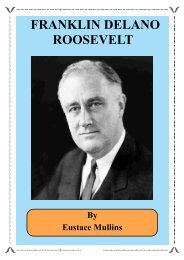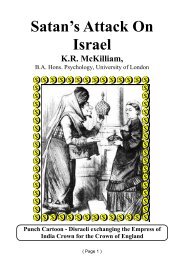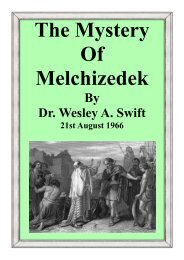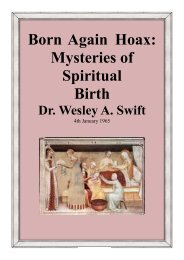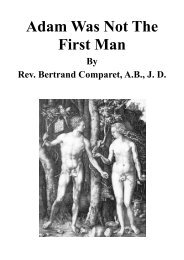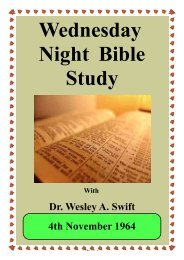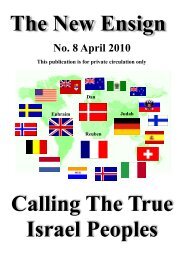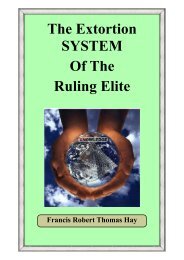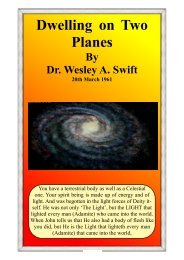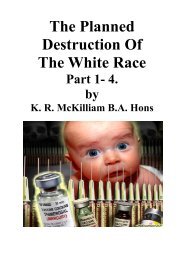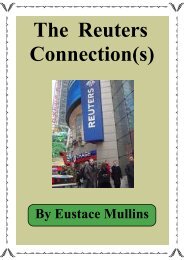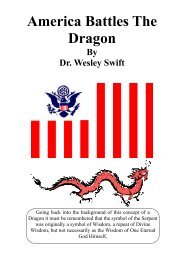Curse of Cannan - The New Ensign
Curse of Cannan - The New Ensign
Curse of Cannan - The New Ensign
Create successful ePaper yourself
Turn your PDF publications into a flip-book with our unique Google optimized e-Paper software.
sequence <strong>of</strong> events, their explanation, or the identification <strong>of</strong> the principals can be followed as<br />
it appears in Genesis, possibly due to mistranslations or editing over the centuries.<br />
Although life on earth had resumed its pre-Deluge felicity, Noah continued to be distressed by<br />
Ham's transgression. So vexed was he that he drank too much wine, and he lay exposed in his<br />
drunkenness. As it is recounted in Genesis 9:24-27, Ham's son Canaan saw his grandfather<br />
exposed, although at one point he is referred to as "Noah's youngest son," instead <strong>of</strong> the correct<br />
designation as his grandson. Noah's other sons, Shem and Japheth, seeing their father exposed,<br />
hastened to cover him with a cloak. However, when he awakened, Noah was greatly infuriated<br />
by what had taken place, and he pronounced a curse on Canaan, "<strong>Curse</strong>d be Canaan; a slave <strong>of</strong><br />
slaves shall he be to his brothers (Shem and Japheth)." Here again is something <strong>of</strong> a riddle, as<br />
Shem and Japheth were the uncles <strong>of</strong> Canaan, not his brothers. <strong>The</strong> "riddle" is probably an<br />
intentional one, because it is intended to evoke a special study <strong>of</strong> these verses to come to an<br />
understanding <strong>of</strong> these very important messages, warnings to all future generations.<br />
Various explanations have been <strong>of</strong>fered for Noah's tremendous anger at Canaan, and his <strong>Curse</strong><br />
<strong>of</strong> Canaan. One, which has now largely been discounted, is that Ham may have slept with Noah's<br />
wife, or that he had made an attempt to do so. No basis for this conjecture has ever been<br />
established. Another explanation is that Noah cursed Canaan because he was still vexed at Ham's<br />
violation <strong>of</strong> God's commandment to the inhabitants <strong>of</strong> the Ark, that they should refrain from<br />
intercourse while on board. Because Ham had slept with the pre-Adamite woman on the ark,<br />
Noah finally vented his wrath in the <strong>Curse</strong> <strong>of</strong> Canaan. This also fails to ring true; the men <strong>of</strong> the<br />
Old Testament were very direct in their dealings; if Noah was vexed with Ham, he would have<br />
cursed Ham, not Canaan. None <strong>of</strong> these explanations <strong>of</strong>fers a valid reason for the vehemence <strong>of</strong><br />
Noah's curse, a curse which has blighted humanity for three thousand years. <strong>The</strong> only rational<br />
explanation for the curse is Noah's anger that Canaan had done something which thoroughly<br />
outraged his grandfather. Looking on him while he was exposed would hardly have caused such<br />
a reaction. Scholars finally concluded that Canaan had done something so degrading that Noah<br />
had to pronounce a curse upon him. What would this have been? <strong>The</strong> Bible as presently translated<br />
does not really give us a clue. <strong>The</strong>se scholars decided that Canaan, being <strong>of</strong> mixed race, and<br />
therefore not bound by the rigid moral code <strong>of</strong> the Adamites, had probably committed a<br />
homosexual act on his grandfather. Being <strong>of</strong> pure stock, Noah would have been exceedingly<br />
wroth at such an act, and would have reacted as he did.<br />
<strong>The</strong> <strong>Curse</strong> <strong>of</strong> Canaan was extended to the land which was named after him, the Land <strong>of</strong> Canaan.<br />
<strong>The</strong> Canaanites themselves, the people <strong>of</strong> this land, became the greatest curse upon humanity,<br />
and so they remain today. Not only did they originate the practices <strong>of</strong> demon-worship, occult<br />
rites, child sacrifice, and cannibalism, but as they went abroad, they brought these obscene<br />
practices into every land which they entered. Not only did they bring their demonic cult to Egypt,<br />
but, known by their later name, the Phoenicians, as they were called after 1200 B.C., they became<br />
the demonizers <strong>of</strong> civilization through successive epochs, being known in medieval history as<br />
the Venetians, who destroyed the great Byzantine Christian civilization, and later as "the black<br />
nobility," which infiltrated the nations <strong>of</strong> Europe and gradually assumed power through trickery,<br />
revolution, and financial legerdemain.<br />
<strong>The</strong> reputation <strong>of</strong> Canaan is to be found in many ancient records, although its foul history has<br />
been carefully expunged from even more <strong>of</strong> the historic archives and libraries. In 1225 B.C., the<br />
Pharaoh Merneptah, who, because <strong>of</strong> his victories in the Canaanite region, was known as "Binder<br />
<strong>of</strong> Gezer," set up a stele to commemorate his successes. Among the inscriptions placed thereon<br />
was this: "Plundered is the Canaan, with every evil; All lands are united and pacified."<br />
This inscription did not mean that Merneptah had used every evil to plunder the Canaan; it meant<br />
that he had in his sojourn there encountered every evil practiced by this notorious tribe.<br />
( Page 7)



